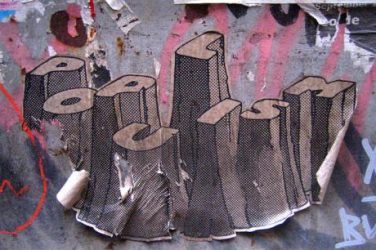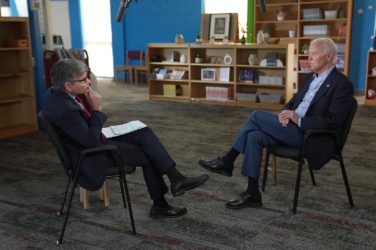“Believe in belief!” A few years back I was asked to suggest a slogan for a US political campaign. Noting both the need human beings seem to have to anchor their convictions/values/prejudices onto something apparently solid, as well as the need for political slogans to offer the illusion of saying something while remaining vacuous, I tossed out the above phrase. It seemed at once to say everything and nothing, to offer a flag under which many could assemble, and propose a tautology (always handy for a politician under questioning). The three word maxim had another, by no means negligible, advantage. It suggested a strong link with religion, whether of the spiritual or lay variety. Very often political movements, whether at their origin or as they gather strength, take on many of the features of religious groupings. If the political entity can manage to obtain a sufficiently strong adherence from a significant number of followers, then its prospects are good. If the leader or leaders of this “lay church” can command personal loyalty of the many, then the future, politically speaking, is even rosier.
Messiahs, or messiah like figures, have always been with us. Unsurprisingly, their influence seems especially strong when periods of crisis are clearly looming, or have already arrived. There is little to be gained from being a self- styled Messiah if times are quiet. So any self- respecting “savior” needs disruption, breakdown, to thrive. The message delivered has to “identify” where, who and what create the problems, and state simply what has to be done to sort out the difficulties. Savonarola seized on the corruption in Medici run Florence; shortly after, Luther raged against the Roman cesspit; and the present occupant of the White House came to power pledging to drain the Washington swamp. Of this trio the redoubtable German has had an enormous impact – but he was the one who deliberately made the least effort to project his own image.
The first two decades of this century, not to mention the opening 6 months of the third decade, have been marked by ruptures of the most severe kind. Technological, financial, political, geopolitical, social, artistic – along all these axes, and in every part of the world, the fractures of violent change are glaring. Insecurity of every type affects more and more people, from those who have always lived on the edge of the abyss, to those who thought their wealth would always protect them but are now finding it harder to hide. These are, of course, the perfect conditions for the Messianic moment. That said, the prospects for different Messiahs to prosper differ enormously from case to case.
The century opened with Osama Bin Laden sending an explosive message, designed to energize one group of people through physically eliminating others. This “double edged” method, that of moving both believers and non-believers at the same time, is very frequently a characteristic of the strategy and tactics of the Messiahs. It seeks to provoke open conflict in the hope of catharsis. In the Messianic worlds, it is a maximum risk approach. It places the prospect of the Messiah as martyr into the limelight and is thus in the long historical tradition of those who, in one way or another, have put their lives on the line. The real politicians don’t do this. They make sure that their brand of Messianic remedies allows them to stay pretty safe. That safety comes through the traditions and institutions of the place where they operate, which gives them a reasonable guarantee that they will not be physically eliminated, and/or from the scope of their messianic message. Let’s apply this standard to some of today’s would be Messiahs.
Duterte in the Philippines is one of those who conducts his version of social cleansing through organized murder. His targets within his own country are persons alleged to be engaged in activities categorized as socially dangerous, e.g. drug dealing, spreaders of revolutionary doctrines, criminals. Little does it matter whether the people actually killed fit into any of the categories, or whether this uncontrolled violence actually has any positive social impact. For Duterte the message is that of “purification” (this notion of a return of society to an imagined pristine condition is recurrent among the Messiahs). He personally probably feels safe since the Philippines does not in fact have much of a tradition of assassination as a political weapon, and in any case he has powerful protection from both the army and the police, not to mention his own henchmen.
In Turkey Erdogan has perforce followed another route. That country, through its history and its geographical position, is not and can never be an island. Whatever happens there is inextricably entangled with events and movements elsewhere. The President has used a mix of military and diplomatic manoeuvers to manage things outside the country, while following a cleansing (of the opposition) policy within the national borders. The Islamic character of the State has been the core of the message, and power is vested in the person of the President to enforce that picture. Nationalism of this hue is thus the doctrine around which the Messiah can propagate the message that the country is protected. Certainly this is a far higher risk situation than Duterte faces in the Philippines – but each Messiah is a case apart. The savior, to paraphrase Ortega y Gasset, is a product of himself and his circumstances.
President Putin has been far more low key in his approach. Coming to power in a great country, Russia, faced with inner turmoil, the loss of many young gifted people through emigration, and a geopolitical panorama distinctly unfavorable, he has sought to establish what is effectively a dictatorship designed to restore former glories. For all the criticism that can justifiably be levied against his policies, Putin is in fact a version of Messiah lite. In common with Duterte, Erdogan and in fact all the contemporary Messiahs, he has not transformed the economy, he has not brought about any real improvement in the standard of living of the majority of the population, has not, in short, reduced the insecurity. But he has to some degree restored a sense of pride for the Russian people. Historically, the Tsars were more or less treated as God. Putin has succeeded in joining that lineage.
Trump is the Messiah with a difference. From Day One, he set out to denigrate more or less everything and anyone that had gone before him in his own country. At one wild stroke, he tried to convert the history of the USA into that of unending failure. No matter that even his own slogan “Make America great again” explicitly recognizes that at one time it might have been great, the real message was that only now, under the Messiah, could the country really achieve. This stance puts him at loggerheads with other Messiahs. They emphasize the strengths of their countries, which will be reinforced thanks to the actions of the Messiah. But they also, to be fair, have it easier than Trump. The USA has, to some degree and at certain times against its better judgement, for so long been overtly championing an international discourse of democracy, freedom etc, that in this century it was manifestly incapable of delivering, that to some degree it had to rein in. That could have been done in many ways – Trump chose the most abrasive, which would simultaneously allow him to project himself at home as a kind of savior.
The self- appointed and self-anointed redeemer can only shine in situations of maximum convulsions, so the Messiah himself has to do his share of stirring up trouble. Right now one or two more or less unexpected fault lines have opened up, namely the COVID pandemic and the explosion of support for a real revolution against racial injustice. Thus the Messiah does not have sole control over the problem set. The highly limited doctrine of redemption vividly visible as the “red baseball cap revolution” is exposed for what it is, namely highly dangerous bluster. Hans Kristian Anderson had lovely words to describe that state of exposure.
No reference to Messiahs would be complete without mention of countries in Latin America. A few decades ago, the outstanding Peruvian novelist Mario Vargas Llosa published his “La Guerra del Fin del Mundo”, describing the real story, in the latter part of the nineteenth century, of the desperate struggles of poor people in the Sertao of Brazil to rally round a Messiah seeking to lead them out of poverty. That terrible series of events ended in slaughter. Since then, the Messianic illusions have plagued the continent with awful consequences. Several of them have been marked by the best of intentions, at least in their early phases.
The Mexican revolution was not lacking in wonderful ideas, only to be twisted into institutionalized immobility. Since in the continent these frustrations frequently become the material for magnificent literature, Carlos Fuentes described that decline with clinical precision in “La Muerte de Artemio Cruz”. Now President Lopez Obrador has adopted an explicitly Messianic tone in seeking to cope with the horrendous problems that present day Mexico faces. He has fertile territory on which to work, with the long traditions of religious and pseudo religious customs in Mexico (brilliantly shown in the work of Frida Kahlo, a genuinely revolutionary artist as compared with her more “establishment” husband, Diego Rivera). Elsewhere Bolsonaro has sought to show that he too is some kind of savior, and is immune to the risks posed by the Coronavirus. In Venezuela, where the Bolivarian version of the Messiah is always strong, the powerful projection made by Chavez has descended into the tragic farce of Maduro. It somehow seems apposite that the revelations of this week, published in the Spanish newspaper “ABC”, show that a decade ago the Venezuelan government donated money to the Italian political group “Il Movimento Cinque Stelle” thinking that this motley mixture was some kind of anti-capitalist force. In fact, it’s main protagonist, Luigi Di Maio, is now known as “Papa Luigi” for his incessant pseudo-moralism and attempts to project himself as some kind of guiding light. Again, today’s reality in Venezuela is graphically depicted in Karina Sainz Borgo’s recent harrowing novel “La Hija de la Espanola”.
What are we to do about Messiahs? Ancient history and the present day have shown that they are always with us. The Messiah cloak is perhaps the finest political garment that can be found, and is permanently in fashion, whatever the climate or place. It seems to have the magnetic force to beguile huge numbers of people, the quack doctor’s remedy for all ills, real or imagined. To inoculate against this very real danger, the only valid substance is the laborious accumulation of evidence and reason. It’s a dull process, and its outcomes do not lend themselves to glittering chutzpah. That is the way things are. But if you want a quick approach, it might not be a bad idea to follow the Romans – declare the guy a god, and build him a statue. That way, you might shut him up, and anyway he will be toppled.
Peter O’Brien, Brussels, 16 June 2020





